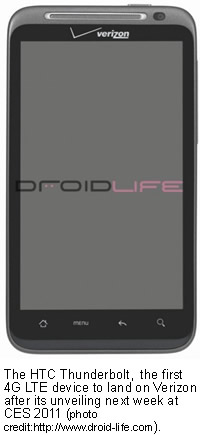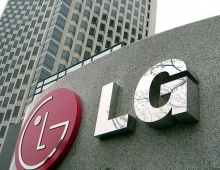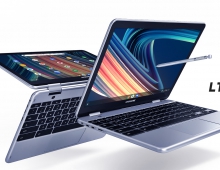
4G Smartphones To Debut at CES 2011
Samsung, LG, Motorola and HTC are expected to showcase their first hardware that marks the arrival of fourth-generation (4G) mobile broadband, at next week's International Consumer Electronics Show (CES).
The fourth-generation (4G) mobile broadband will succeed the current 3G technology.
 Samsung Electronics, LG Electronics and Motorola will showcase their first Long Term Evolution (LTE) smartphones and other 4G devices.
Samsung Electronics, LG Electronics and Motorola will showcase their first Long Term Evolution (LTE) smartphones and other 4G devices.
Taiwan's HTC will also reveal its highly-anticipated successor to the Evo 4G and G2.
American mobile carriers Verizon, AT&T, T-Mobile and Sprint will bring the new devices to the U.S. running within their upgraded networks supporting 4G candidate technologies LTE and HSPA-plus. Verizon is expected to promote its first LTE handsets at the CES, while AT&T plans to match its rival with its HSPA-plus offerings.
Samsung will have on display a lineup of LTE and HSPA-plus handsets at CES 2011, in an effort to comptete with Taiwanese rival HTC, which has already offering the LTE-ready HTC Thunderbolt through the Verizon network. HTC is also expected to unveil the EVO 4G model with Sprint and the G2 model (same device with T-Mobile.
Samsung will be also showcasing its LTE telecommunications equipment and systems. The company has an agreement with Sprint to provide 4G equipment.
LG and Motorola are also rumored to be bringing LTE smartphones that run on Google?s Android mobile operating system at CES 2011.
4G stands for the fourth generation of cellular wireless standards. It is a successor to 3G and 2G families of standards. According to the ITU (International Telecommunication Union) standard, which was recently released, speed requirements for 4G service set the peak download speed at 100 Mbit/s for high mobility communication and 1 Gbit/s for low mobility communication.
Sprint initially announced 4G service but in fairness 4G standards had not been established at the time. And it seems that with the new 4G standards relased, Sprint CEO Dan Hesse has phased out the advertising terminology.
This has not slowed T-Mobile and Verizon to promote their versions of "real 4G." Of couurse, they don't come close to the ITU recently published 4G standards - that will be "a little more costly!"
But, don't worry, the FCC (Federal Communications Commission) will monitor it, protect you... :)

In 2011 because of the growth of data/content service demand U.S. providers will finally do more than just float tiered-service trial balloons. They will implement it across the board.
 Samsung Electronics, LG Electronics and Motorola will showcase their first Long Term Evolution (LTE) smartphones and other 4G devices.
Samsung Electronics, LG Electronics and Motorola will showcase their first Long Term Evolution (LTE) smartphones and other 4G devices.
Taiwan's HTC will also reveal its highly-anticipated successor to the Evo 4G and G2.
American mobile carriers Verizon, AT&T, T-Mobile and Sprint will bring the new devices to the U.S. running within their upgraded networks supporting 4G candidate technologies LTE and HSPA-plus. Verizon is expected to promote its first LTE handsets at the CES, while AT&T plans to match its rival with its HSPA-plus offerings.
Samsung will have on display a lineup of LTE and HSPA-plus handsets at CES 2011, in an effort to comptete with Taiwanese rival HTC, which has already offering the LTE-ready HTC Thunderbolt through the Verizon network. HTC is also expected to unveil the EVO 4G model with Sprint and the G2 model (same device with T-Mobile.
Samsung will be also showcasing its LTE telecommunications equipment and systems. The company has an agreement with Sprint to provide 4G equipment.
LG and Motorola are also rumored to be bringing LTE smartphones that run on Google?s Android mobile operating system at CES 2011.
4G stands for the fourth generation of cellular wireless standards. It is a successor to 3G and 2G families of standards. According to the ITU (International Telecommunication Union) standard, which was recently released, speed requirements for 4G service set the peak download speed at 100 Mbit/s for high mobility communication and 1 Gbit/s for low mobility communication.
Sprint initially announced 4G service but in fairness 4G standards had not been established at the time. And it seems that with the new 4G standards relased, Sprint CEO Dan Hesse has phased out the advertising terminology.
This has not slowed T-Mobile and Verizon to promote their versions of "real 4G." Of couurse, they don't come close to the ITU recently published 4G standards - that will be "a little more costly!"
But, don't worry, the FCC (Federal Communications Commission) will monitor it, protect you... :)

In 2011 because of the growth of data/content service demand U.S. providers will finally do more than just float tiered-service trial balloons. They will implement it across the board.





















